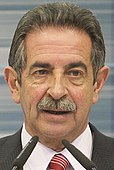| |||||||||||||||||||||||||||||||||
All 35 seats in the Regional Assembly of Cantabria 18 seats needed for a majority | |||||||||||||||||||||||||||||||||
|---|---|---|---|---|---|---|---|---|---|---|---|---|---|---|---|---|---|---|---|---|---|---|---|---|---|---|---|---|---|---|---|---|---|
| Opinion polls | |||||||||||||||||||||||||||||||||
| Registered | 384,993 | ||||||||||||||||||||||||||||||||
| Turnout | 283,197 (73.4%) | ||||||||||||||||||||||||||||||||
| |||||||||||||||||||||||||||||||||
| |||||||||||||||||||||||||||||||||
The 1983 Cantabrian regional election was held on Sunday, 8 May 1983, to elect the 1st Regional Assembly of the autonomous community of Cantabria. All 35 seats in the Regional Assembly were up for election. The election was held simultaneously with regional elections in twelve other autonomous communities and local elections all throughout Spain.
The People's Coalition, an electoral alliance made up of the People's Alliance (AP), the People's Democratic Party (PDP) and the Liberal Union (UL) which fielded incumbent president José Antonio Rodríguez Martínez as its candidate, won the election with an unexpected absolute majority of seats in spite of the Spanish Socialist Workers' Party (PSOE) having won the October 1982 general election in the region.[1] The PSOE came second with 15 seats, its defeat mainly attributed to independent mayor of Santander Juan Hormaechea's personal appeal in the concurrent local elections securing an insurmountable lead of 22,000 votes in favour of the Coalition in the capital city of Cantabria.[2] The Regionalist Party of Cantabria (PRC) entered the Assembly with 2 seats. The former ruling party of Spain, the Union of the Democratic Centre (UCD), had chosen to dissolve itself in February 1983 and did not contest the election as a result.[3]
While the election result would allow the Coalition's candidate, José Antonio Rodríguez, to get elected as regional president,[4][5] a series of political discrepancies and a crisis between AP and PDP would lead to his resignation on 2 March 1984, being replaced by AP's Ángel Díaz de Entresotos until the end of the legislature.[6]
- ^ "Los socialistas deberán pactar en cinco comunidades atonómas para gobernar". El País (in Spanish). 10 May 1983. Retrieved 11 December 2019.
- ^ "El poder, en manos de ex centristas". El País (in Spanish). 10 May 1983. Retrieved 11 December 2019.
- ^ "La crisis de UCD culmina con la decisión de disolverse como partido político". El País (in Spanish). 19 February 1983. Retrieved 13 December 2019.
- ^ "José Antonio Rodríguez, elegido presidente del Gobierno cántabro". El País (in Spanish). 16 June 1983. Retrieved 8 December 2019.
- ^ "Tomó posesión de su cargo el presidente regional de Cantabria". El País (in Spanish). 18 June 1983. Retrieved 11 December 2019.
- ^ "La inminente dimisión de Rodríguez como presidente de Cantabria cerrará la primera crisis interna de la Coalición Popular". El País (in Spanish). 19 February 1984. Retrieved 11 December 2019.


